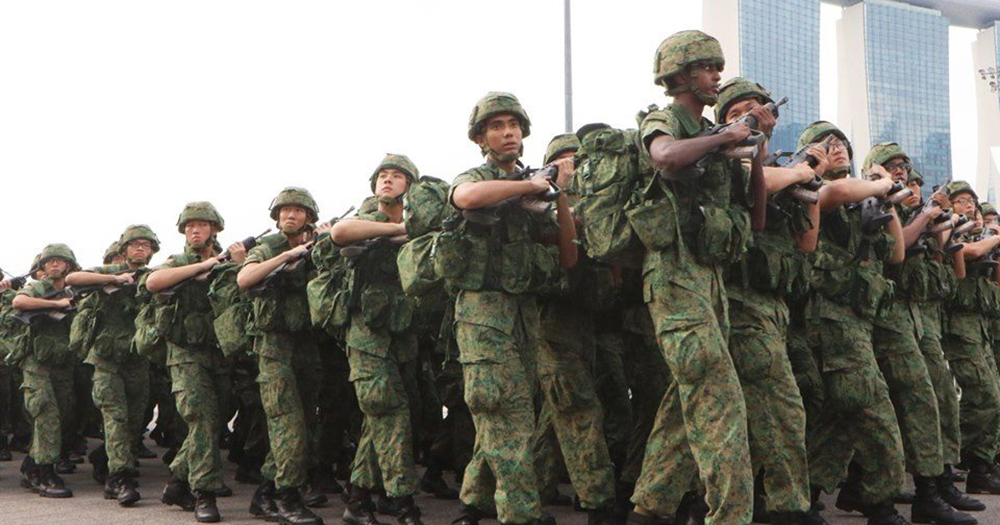Follow us on Telegram for the latest updates: https://t.me/mothershipsg
The Digital and Intelligence Service (DIS) is the Singapore Armed Force's (SAF) fourth service alongside the army, navy, and air force.
The new branch of the military, to be set up by the last quarter of 2022, will "tackle digital threats that will grow in scale, sophistication and organisation." said the Ministry of Defence (MINDEF).
This is part of the Next Gen SAF, which the MINDEF said will take shape by 2040, to be more "networked and capable of conducting operations in the air, land, sea and digital domains to better defend Singapore’s peace and security".
Minister of Defence, Ng Eng Hen, elaborated on DIS during MINDEF's Committee of Supply (COS) debate in Parliament on Wednesday (Mar. 2).
Threats in the digital domain
Ng said in Parliament on Mar. 2:
"The digital terrain has become as real as the land, air, and sea domains for which we have raised the army, the air force, and the navy."
He added that some would argue that the digital domain will be the "dominant domain" for future generations, saying:
"Threats that emanate in the digital domain can readily impact events in the real physical world. That divide between virtual and physical in security terms is a false one, as the two are in fact, intricately interwoven."
Ng gave examples of countries or non-state entities like terrorist groups that use a combination of attacks to both the digital and physical domains.
He pointed out that Ukraine has been fighting cyberattacks even before the invasion by Russia.
According to a Financial Times (FT) article that Ng referred to in Parliament yesterday, Ukraine has been under constant attack from Russian and Kremlin-backed hackers since Moscow’s 2014 annexation of Crimea. The objectives of these attacks included cyber espionage, damage to databases and servers, disruption to power and communications, and disinformation, FT reported.
Ng also quoted V.S. Subrahmanian, a professor of computer science at Northwestern University in the U.S., who commented on the situation.
Subrahmanian stated that there were likely more attacks over the years that were undetected and that have left malware embedded in systems ready to be activated. He likened this to having "a bomb being planted in your house".
Ng said that the SAF should learn and adjust now.
"When we look at all these incidents in the digital domain, what then should our response be? Fortunately, our intelligence sources have not identified such orchestrated attempts to subvert or subjugate Singapore using hybrid means. But that does not mean the threat will never come, so I think we best prepare now with a longer runway."
"For the SAF, a clear cut response is a fourth service," added Ng.
Digital and Intelligence Service
The DIS will provide enhanced intelligence, advanced connectivity and resilient digital defence for the SAF, said MINDEF.
Ng added:
“The human resource is particularly important for the intelligence services, and having a service status, just like army, navy and air force will enhance recruitment and career prospects considerably.”
Over the past decade, MINDEF and SAF have progressively built up the Command, Control, Communications, Computers and Intelligence (C4I) Community – which will evolve to the fourth service – to enhance the resilience of networks and systems.
Ng said that Singapore needs not only an intelligence force but a dedicated digital force to "deal effectively with digital threats from external aggressors that we expect will grow in numbers, sophistication, and organisation".
He added that "the current Defence Cyber Organisation (DCO) is building up such a force but it's insufficient for the SAF's expanding needs and mandate."
"Figuratively, if the digital force is now a battalion force, we actually need a few brigades, perhaps even a division-size force," he said.
SAF's efforts in digital defence
According to The Straits Times, the C4I Community participated in various SAF operations including the deployment of imagery analysis teams to the Middle East in 2015 as part of the coalition formed to defeat ISIS.
The Defence Cyber Organisation (DCO) was formed in 2017 to lead MINDEF and the SAF’s cyber defence and cybersecurity efforts. It also seeks to secure networks and systems across the defence sector.
Also in 2017, was the inauguration of the C4 Command where the Cyber Defence Group (CDG) was created under the new SAF C4 Command to provide 24/7 cyber defence of the SAF’s networks.
And in February 2018, the Cyber NSF scheme was launched to enable the SAF to rope in cyber talent available in each enlistment cohort.
Follow and listen to our podcast here
Top image from The Singapore Army Facebook page.
If you like what you read, follow us on Facebook, Instagram, Twitter and Telegram to get the latest updates.
